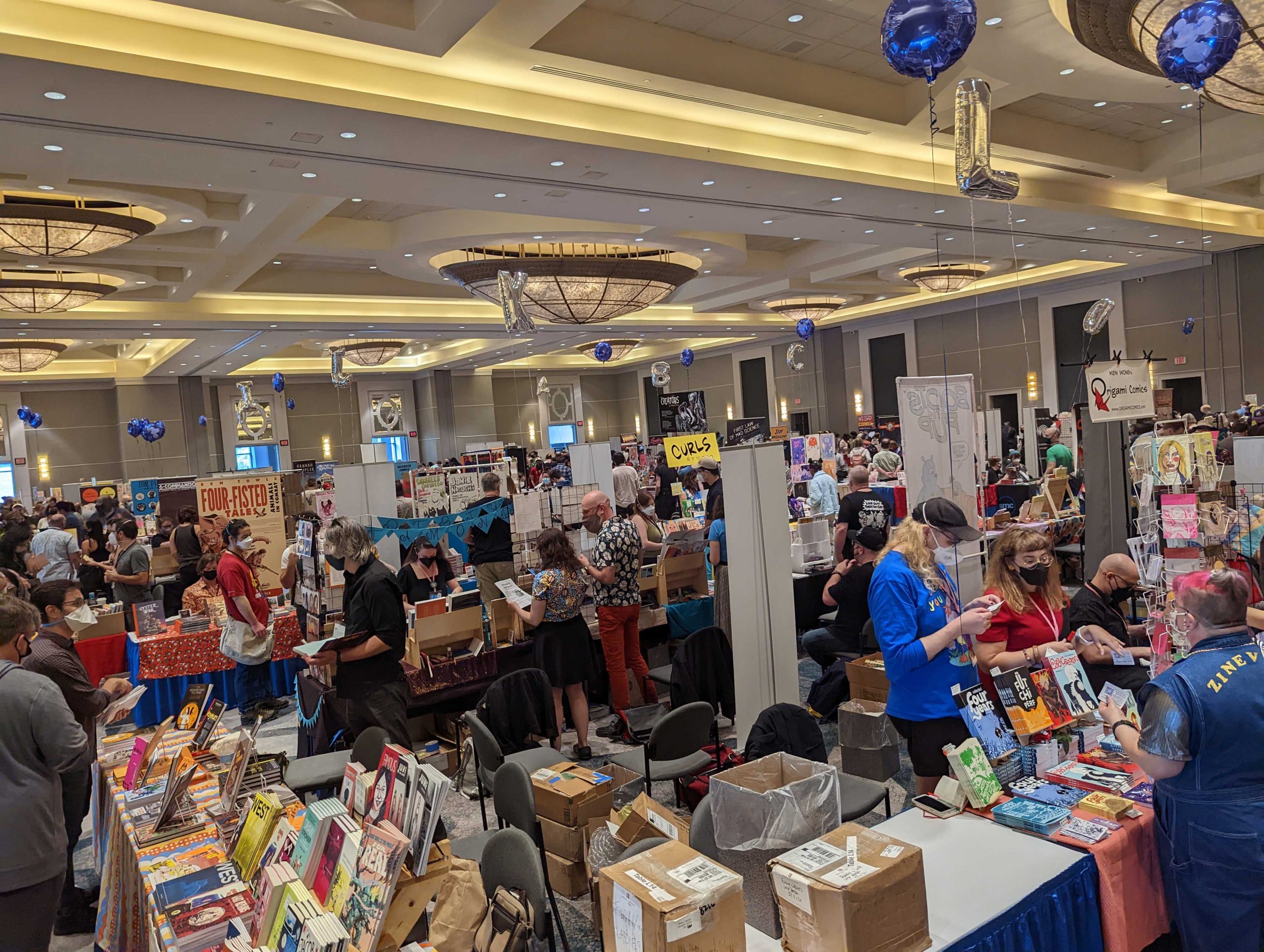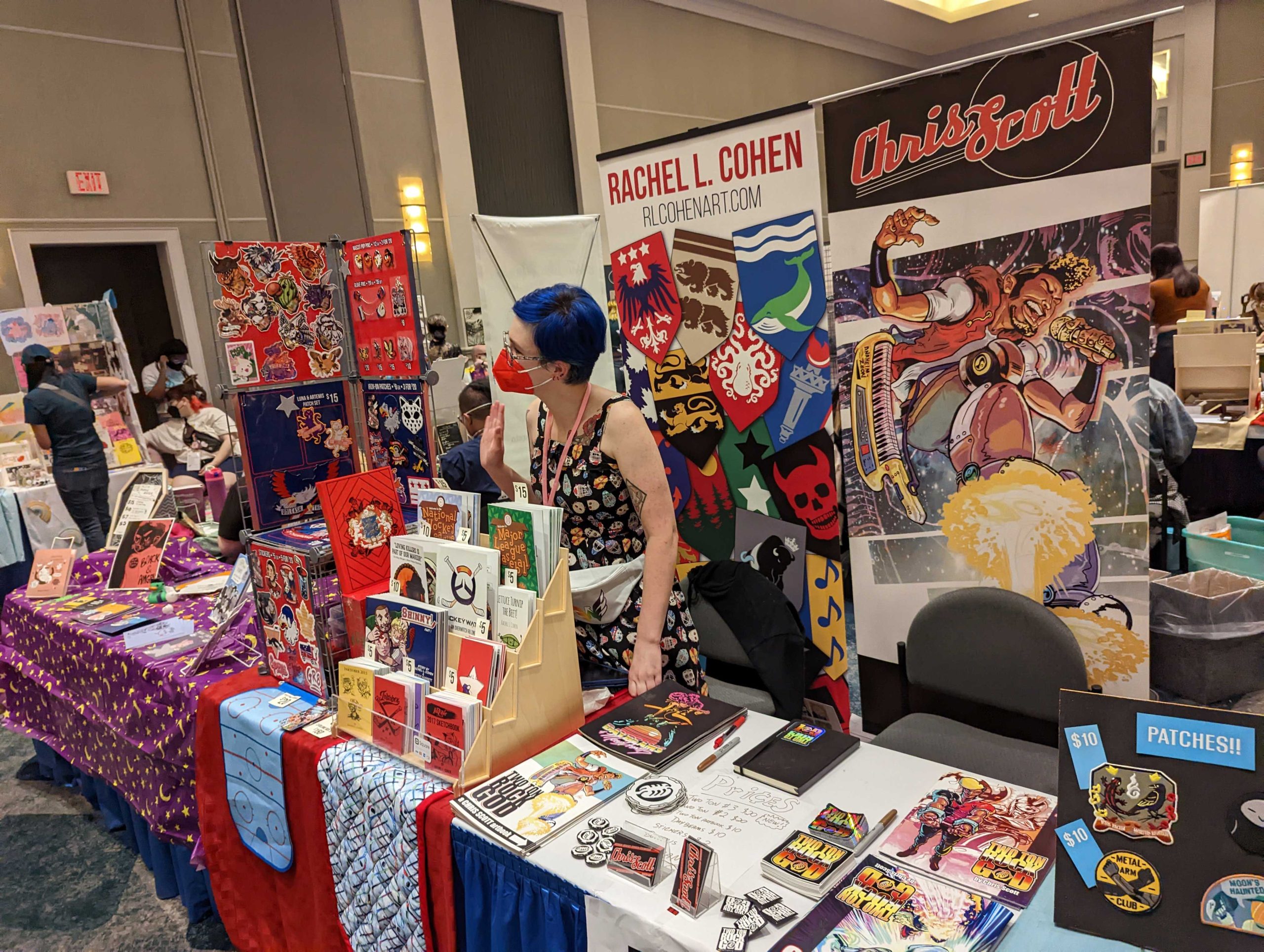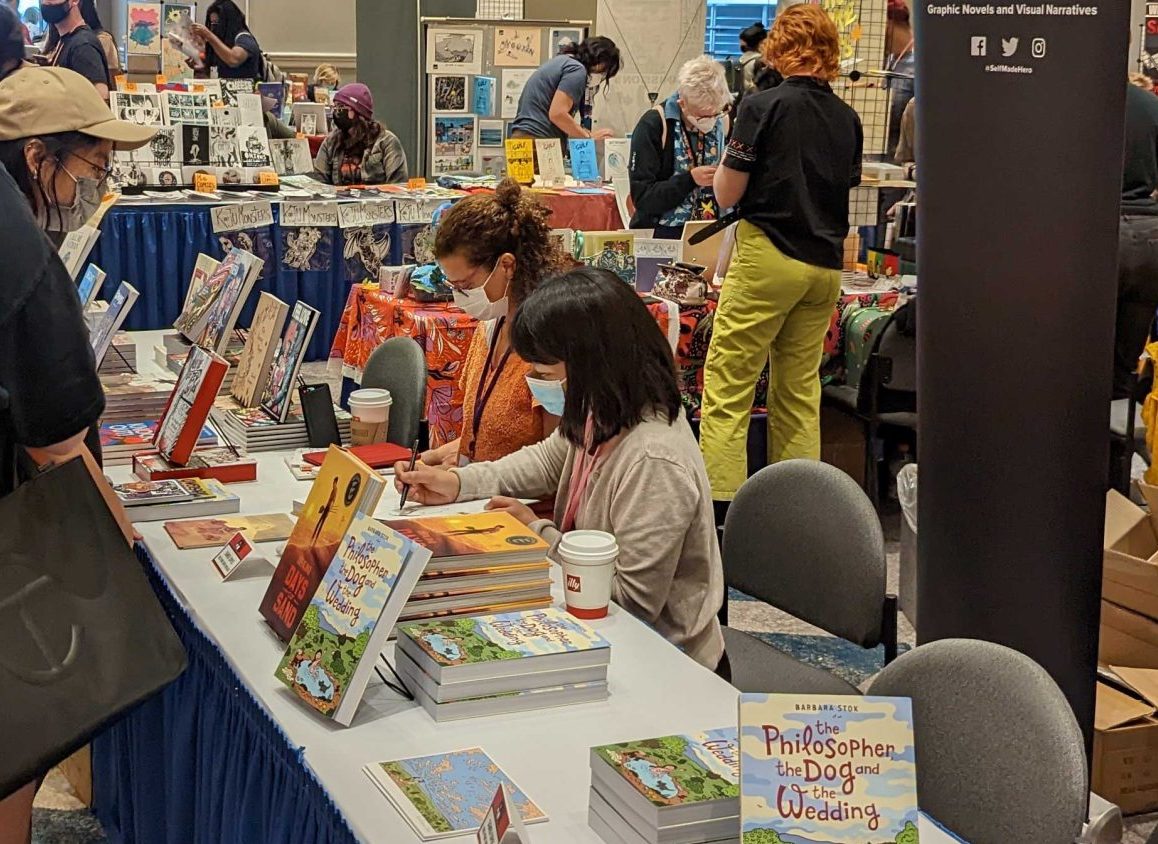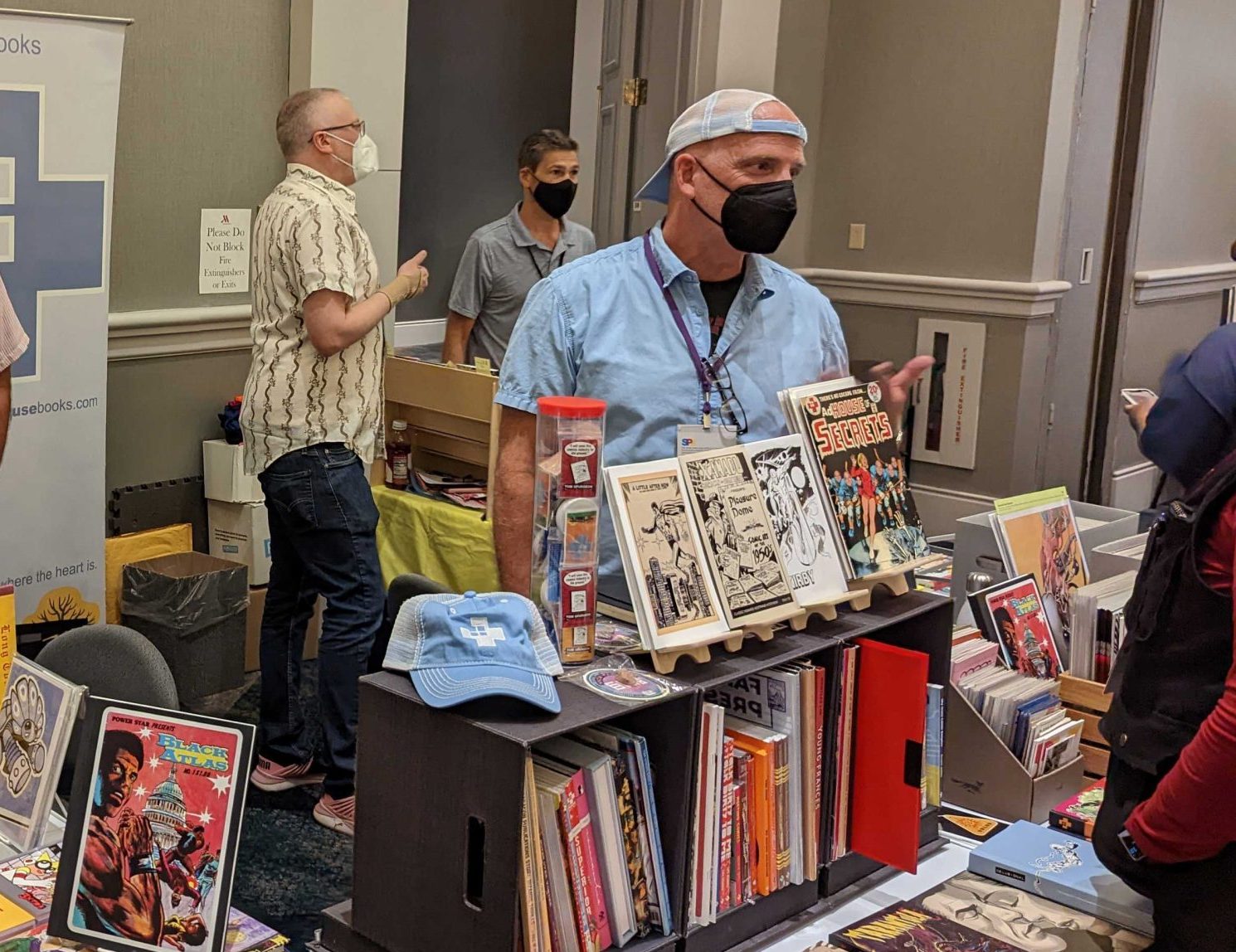Dispatches from Comics Camp – A Report from SPX 2022
This past weekend, the Small Press Expo was held in person for the first time since 2019, reconvening in its usual home at the Bethesda North Marriott Hotel & Conference Center. I attended the show—wandering among the booths, stopping to chat with anyone who could spare a moment—to find out what makes SPX special, and what it’s like to be back in person after all that time.
-Jason Bergman
* * *
 All photos by Jason Bergman.
All photos by Jason Bergman.
One of the first things that stood out to me is that the crowd was a bit lighter than the previous pre-pandemic show. In 2019, the venue was starting to feel a bit cramped, and led some to wonder if a larger one was going to be needed in the coming years. Of course, then the pandemic happened, making that a moot point.
Warren Bernard (Executive Director, Small Press Expo): We had to have a show. We couldn't have one last year - we actually called last year very early, because we just didn't know what was going to happen. So we made a decision. The health department canceled 2020. We went ahead and proactively canceled 2021, because, you know, we didn’t know how many people were going to have the vaccine.
I haven't looked at the figures yet. But [attendance] is a little bit lower. We're not Toronto, we're not Manhattan. There are two different measures [of success]. One measure says, how many people come through the door, and [the] other measure says, if you go and talk to, particularly the big exhibitors like Fantagraphics and Top Shelf, how are you doing? And they're doing fine. We don't get the attendance that those other two shows [the Toronto Comic Arts Festival and the MoCCA Arts Festival in Manhattan] get. But the people here spend more per capita.
Potentially contributing to the lighter crowd was the absence of several of regular exhibitors, including indie titan and SPX mainstay Drawn & Quarterly.
Warren Bernard: When it comes to Drawn & Quarterly, they're making a very interesting strategic [choice]. And they are dedicating their resources to attending the American Library Association [Annual Conference & Exhibition] and regular book fairs as opposed to the comics festivals. We're hoping to get them back next year, we'll see what's happening. But I understand why they're making that move. You have so many dollars, where do you think you can make the biggest hit both PR wise, and in terms of sales?
Another notable absence from the show was Iron Circus Comics. Reached by email for comment, founder C. Spike Trotman confirmed that the company has been cautious about returning to conventions, particularly in light of reports of COVID transmission from other recent shows. The company hopes to be "back in full force next year,” and is looking at SPX as one of the shows they attend.
Because COVID continues to be a problem in this country, SPX did require masks for all attendees and proof of vaccination. While Bernard isn’t aware of anyone refusing to attend because of those requirements, the virus itself did still prevent some from attending.
Warren Bernard: I know of a couple of exhibitors that came down with COVID and weren’t able to make it at the last minute. Starting around 10 days before, I got like a half a dozen people that said, "I’m sick with COVID, I can’t come." But in terms of people who are exhibitors who were like, oh, because you’re asking us to be vaccinated en masse, we’re not going to come? Nah, that didn’t happen.
 The SpiderForest webcomic collective table.
The SpiderForest webcomic collective table.
Talking to those that did make it, it was clear that everyone was very happy to be back in person.
Rachel L. Cohen (various minicomics, self-publisher): Oh my god, it's incredible. Absolutely incredible. I love the show so much. I always leave exhausted and inspired. And just seeing everyone back together in person again, just warms my heart. I love comics!
Aron Fitzgerald (Tamuran, SpiderForest): This is the first time I've done a convention since before the pandemic. There's a lot of good energy, and a lot of it's just exciting to be back in the swing of things and sharing comics with people and being around such cool, weird, awesome comic readers and creators.
Maxwell Kinne (Jack Beloved, SpiderForest): I love that it's more about the small, you know, indie comic scene and less about those big publishers. We got small publishers here. And we got some educators here too, which I think is really exciting. So I'm thrilled to be here. It's my first con ever, [my] first time ever selling at a con. This is a very good first for me, I think.
Ashley Gallagher (Comrade Himbo, POMEpress): A lot of the folks I have spoken to have also been first-timers. And I think we're all sort of equally excited. Everyone who has been attending has been incredibly gracious.
Caroline Cash (Pee Pee Poo Poo #69, self-publisher): I like SPX because since everyone stays in the hotel, it seems like more of a fest for hanging out, which is really nice. And I feel like people really make friendships here more so than at other fests.
 Hannah Templer.
Hannah Templer.
The communal nature of SPX is something that was highlighted by several people, with Bernard going so far as to refer to SPX as “camp comics,” a motif reflected in the attendee guide artwork by Rumi Hara.
Aimée de Jongh (Days of Sand, SelfMadeHero): For three years, we were all isolated. And we didn't really see anyone like us. I mean, especially cartoonists, we just work in our home. We don't really go anywhere to work. We have no, like, colleagues. So to go to shows for us, it's also seeing friends and also seeing colleagues. It's what normal people do every day. We do it once a year, you know, so if that falls apart, then we have nothing. Sounds so sad, but it's true.
Catalina Rufin (various minicomics, self-publisher): This is my second [SPX]. My first one was in 2018. So, pre-pandemic. It’s really exciting [coming back]. I knew that when I went to my first SPX I wanted to come back, because there was a certain kind of magic here. Everyone is really friendly and enthusiastic. And there's no sense of superiority between the pros and the people who are starting out. Or the Ignatz winners and the non-winners. There's just such a great enthusiasm for comics.
Hannah Templer (Flung Out of Space, Abrams ComicArts; Cosmoknights, Top Shelf): I'm very happy to be back. It's great. It's great seeing everybody. And yeah, I mean, this is the first show I've done in three years. My last show was SPX 2019. [SPX is] a really great showcase of a lot of voices, independent voices that are harder to access. Just a lot of new voices that I'm not familiar with, which is really exciting. It feels like a really great community to meet new artists, and also see my favorite artists, they're always here.
Mindy Indy (Aer Head, self-publisher): It's a little different with the masks and stuff, but it's pretty similar to how it's been [in the past]. When I did the show last time, I was promoting Aer Head as a Kickstarter, and the book didn't exist at the time, but now it exists, and it's in the world. So that's very exciting to have come full circle. It's like, yes, now I have it in all its glory at the show. And I'm also promoting my next Kickstarter, which will be for Aer Head #2, which I'm going to launch in October.
Mark Lindblom (Famous Cartoonists toy figurines, DC Conspiracy): Historically [SPX has] just got a very DIY vibe. And you can go up to tables and trade, where you don't get that kind that feeling at other shows. So it's very independent. And the organizers seem to make it a point of bringing in just kind of small-time operators, so that they can present their stuff. That kind of feeling gets into the show.
 Rachel L. Cohen.
Rachel L. Cohen.
One notable aspect of SPX is the show’s equal opportunity for access to tables. Rather than first come, first served, potential exhibitors enter a lottery system and are drawn at random.
Rachel L. Cohen: I have tried to get into other comic-specific shows. I would love to attend MICE [the Massachusetts Independent Comics Expo] one of these days. It's just so competitive, because there's so many incredible artists out there. I tend to stick to the DC area. And this is the second year the lottery has been kind to me. I'm glad they have the lottery system because it brings in a lot of new faces every year and it gives everyone an equal chance to show off their stuff.
Even with COVID protocols in place, some exhibitors found the experience a bit daunting after so long in isolation.
Vanesa R. Del Rey (Out of Step Arts): [It’s] a little strange. A little overwhelming. It’s more crowded than I was expecting. Weird to be around this many people again. I did Toronto Comicon a few months ago. This show is more fun. It's more underground work that you wouldn't see on a main comic show.
B. Erin Cole (Little Brain Comics): I don't think I've been in a room with this many people since 2019. It was definitely more overwhelming this morning. But now it's just like, oh, yeah, I remember this. These last couple of hours, it's actually been really good. Like sales have been higher than I thought, so I'm happy. But it's just like, oh yeah, I forgot people. There's a lot of them.
 B. Erin Cole.
B. Erin Cole.
Strong sales were definitely a theme among everyone, recalling Bernard’s statement that attendees tend to spend more at SPX.
Ashley Gallagher: The crowd has been fabulous. We’ve been selling really well. We're almost sold out of a couple of things - our promotional items, these shorts [points to booty shorts promoting zir book Comrade Himbo] have gone like that [snaps fingers]. This book is almost sold out. I gotta say this con is probably the best organized one I've been to. This year, we didn't do a lot [in the way of shows]. We went to TCAF... gosh, I can't even remember what else, but I've just been having the most amazing experience. I think we're selling better than we have at other shows. I don't know if part of that is because we are a new face here. So the stuff that we have is new to the crowd. I don't know. Everyone told me that this would be, like, our show, that we would find our people here. And so far that seems to be holding out.
 Aimée de Jongh (in grey) signing at the SelfMadeHero table.
Aimée de Jongh (in grey) signing at the SelfMadeHero table.
Dutch cartoonist Aimée de Jongh was one of several guests attending from overseas, and brought a unique perspective to the show and how it compares to European comics festivals.
Aimée de Jongh: European comics, like Tintin or Asterix are… they're pretty old fashioned, pretty traditional. And there's a big group of people who still buy those comics and a lot of festivals are aimed at that public. So there's not a lot of young people at those festivals. There's not a lot of queer people or people of color - you know, it's a very different audience. And I do sell well in that audience, but I don't particularly recognize myself in them. And so when I come here, I'm like, "Oh, these are my people. Finally."
New Brunswick artist Lia Taylor agreed about the audience.
Lia Taylor (various minicomics and witchcraft items, CRUCIFIXVI): For me, [SPX] definitely is a coming together of so many people who are passionate about the art, and passionate about comic books, but not the kinds of stuff that is more mainstream. So there's just such a good collective of artists and individuals who are really passionate about what comics and zines have been and continue to be. There's just... the kind of counterculture underground, subversiveness of SPX is just so cool.
One of the marquee guests this year was Maia Kobabe, whose three-year old memoir Gender Queer has made headlines as the most banned book in the country. Kobabe sold out of that book fairly quickly, but eir table was stocked with other work (including self-published minicomics) for the rest of the show.
Maia Kobabe (Gender Queer, Oni Press; various minicomics, self-publisher): This is one of the [shows] that has the most authors that I am excited about. So I have spent a lot of money today already. Many books that were on my to-purchase list. And so many of the indie comics authors of all of North America prioritize this show. It's really nice to come to [SPX] and get more of the east coast and some folks from Canada, it's really great.
 View of the show floor, with the Bubbles Fanzine table at center.
View of the show floor, with the Bubbles Fanzine table at center.
While there didn’t seem to be any particular theme among the work represented, it did seem like personal stories and memoirs were in abundance.
Mac Maclean (various minicomics, self-publisher): I feel like I've seen a lot more nonfiction and memoir work. But then, I was expecting [that] to be the biggest thing this year. And I love seeing that, as I do it myself. We had a couple of years to reflect. And I think it's a lot of time to consider yourself and your place in the world and how your experience could be relatable to other people and how we've all experienced a universal event. And we all had different times during it.
Maia Kobabe: I think everybody has a lot of exciting new stuff that they worked on, you know, during the pandemic. I'm excited about everyone who has had some revelations about their gender while we've been a little bit away from the world and unobserved, and it's been exciting to see some people thinking, "I've rethought my pronouns. I've rethought my name. I've rethought how I want to present myself in the world." While we were away from it for a while.
The crowd and exhibitors at SPX have been skewing towards a younger audience for years, but underground comix icon Denis Kitchen was back, and seemed to be doing brisk business selling artwork and books from his archive.
Denis Kitchen (Denis Kitchen Art Agency): It's clearly a young show. A lot of the shows I go to, you know, I'm looking at a lot of gray beards. And that's okay, too, because I'm one of them. But to me, this is a very vital part of the comics movement. And it's always, to me, reenergizing because I see a kind of pure excitement. I don't see a lot of commercialism. I see art for art's sake. I see people who are truly dedicated to their craft and express ideas in a way that all artists should be inspired by.

* This article was originally published here
Comments